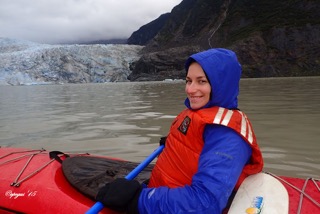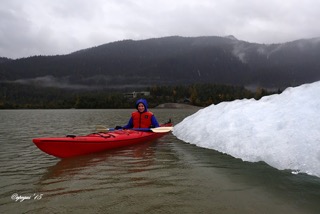Valentina Melica è una borsista Fulbright italiana che si trova al momento negli Stati Uniti per iniziare il percorso di Ph.D. Partita da Treviso alla volta dell’Alaska, Valentina si occuperà di studio e ricerca dei mammiferi marini e d icome le attività umane possano alterare la fisiologia di questi animali.
Il Programma Fulbright in questi mesi sta dando il proprio contributo, attraverso il Fulbright Arctic Initiative, ad una serie di eventi che riguardano lo studio delle problematiche relative ai cambiamenti climatici, sostenibilità ambientale e cura della fauna e del territorio della regione artiche.
Abbiamo chiesto a Valentina di raccontarci come è iniziato il suo soggiorno in Alaska.
My name is Valentina and I am 27 years old. I was born and raised in Treviso, a city in the north-east of Italy, about 20 minutes from Venice. I hold a Master’s in marine environmental biology from the University of Trieste. I have always been passionate of marine organisms and through my academic career I had the chance to study many of them, from phytoplankton to harbor seals. Thanks to an internship experience conducting research on marine mammals, I finally figured out my interests and -above all- that I was ready to further my education with a Doctoral Program. And here I am.

I have just started my PhD in Fisheries at University of Alaska Fairbanks under the auspices of the Fulbright Scholarship. My advisor is Dr. Shannon Atkinson, a leading researcher in the field of marine mammals endocrinology. Although not yet defined, my project will focus on how human activities may affect hormones production and physiological response in marine mammals.
As I mentioned I have this opportunity thanks to the Fulbright Program. I am honored to be a grantee. The reason why I applied to the Fulbright program is, besides its prestige, its strong core message. I deeply share the program’s principles of international partnership and mutual understanding, since I believe they are the basis to make a positive and powerful impact in a world that day by day brings down physical barriers, yet grows cultural ones, mostly led by ignorance and xenophobia.

For my program, I am based in Juneau, the state capital. Juneau is situated in the Southeast region of Alaska and although it’s the capital, it’s not the most populated city. Only 33,000 people live here.
The state of Alaska is indeed very big, with a low population density and it is characterized by many different environments. What is peculiar about Juneau, it’s that living here is much like living on an island. It is surrounded on three sides by water and the other by glacial ice fields and it is situated in a temperate rainforest. So yes! It rains A LOT! But I am getting used to it. A good pair of rain boots and a rain jacket are a must-have for this City. Moreover I have been lucky enough to enjoy some great sunny days.
I am currently attending four classes, potentially useful to my project.
I have been doing a lot of fun outdoor activities during the weekends such as hiking (Juneau area is plenty of good trails), berries picking and kayaking. Everyday I am charmed by the beauty of this Land: stunning landscapes, breath-taking northern lights, wildlife sighting and so on, made even more magnificent by the friendship and help of all the great people I have met so far. In all honesty, when I listed Alaska in my application as a possible destination, I only looked at the program I wanted to get in. Geography was simply collateral. Right now I could not be happier of my choice!
